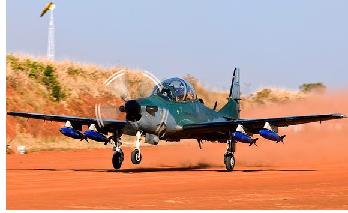Embraer
Embraer hits defense barrier
 Brazilian-based aircraft manufacturer Embraer SA won an important victory in late December, when the U.S. Air Force picked one of its planes to equip Afghanistan's military.
Brazilian-based aircraft manufacturer Embraer SA won an important victory in late December, when the U.S. Air Force picked one of its planes to equip Afghanistan's military.
But Embraer's foothold in the U.S. defense market is now in question: rival Hawker Beechcraft Corp. is fighting in court to keep the Air Force from moving forward with the project. Defense analysts and observers say the legal tussle over the warplanes underscores how difficult it can be for foreign-based firms to crack the U.S. military market.
At stake is a contract worth $355m to Embraer and its Nevada-based partner, lead contractor Sierra Nevada Corp., to deliver a fleet of 20 Embraer Super Tucano single-engine, turboprop planes that will fly training missions for Afghanistan's nascent air force and attack insurgents on the ground.
The new aircraft are an important part of the U.S. exit strategy: Afghan troops still rely heavily on air support from the U.S. and its allies, and Super Tucanos would give the cash-strapped Afghan military a fleet of attack planes that are comparatively affordable to operate.
But the contract would also give Embraer a leg up when marketing the plane internationally: According to defense-industry observers, having a product selected by the U.S. military, which has a reputation for rigorous weapons testing, is an advertisement in itself.
"If the United States is buying it, other people want to buy it," said Michael Herson, the president of American Defense International, a lobbying firm that represents a number of European and international defense clients, although not Hawker Beechcraft or Embraer. "It's the Good Housekeeping Seal of Approval, because the U.S. military only buys the best."
Embraer didn't respond to requests for comment.
For military manufacturers, the U.S. defense market is the largest in the world. And, despite planned cuts to U.S. defense spending, it is expected to remain that way. President Barack Obama acknowledged that fact last week when outlining the upcoming Pentagon spending cuts, saying U.S. military spending "continues to be larger than roughly the next 10 countries combined."
International weapons manufacturers, large and small, sell equipment to the U.S. military. The U.K.'s BAE Systems PLC is an important supplier of artillery and armored vehicles. The French- and German-led European Aeronautic Defence & Space Co., or EADS, the parent company of Eurocopter, makes utility helicopters for the Army. Both companies have separate, U.S.-incorporated arms to comply with U.S. regulations. Embraer also has a separate U.S. entity, headquartered in Florida.
But the U.S. arms market can presents hurdles to entry, even for companies from countries that are closely allied to Washington.
The most famous example: For nearly a decade, EADS was locked in a politically charged contest with rival Boeing Co. to sell aerial refueling tankers to the U.S. Air Force. Boeing ultimately won the competition, which stoked "buy American" rhetoric in Washington and was the subject of intense scrutiny by lawmakers.
In contesting the Air Force decision on the Afghan planes, Hawker Beechcraft emphasized the potential loss of U.S. jobs. The Sierra Nevada-Embraer team, however, says it will assemble the Super Tucanos in Florida.
"The U.S. market isn't easy" for foreign-based defense suppliers, said Richard Aboulafia, an aviation analyst with Teal Group, an aerospace-and-defense consultancy.
Mr. Aboulafia noted that a previous bid by Embraer to land U.S. orders for an Army surveillance plane ended in failure after the Army scrapped the program.
David Berteau, a defense-industry expert at the Center for Strategic and International Studies, said U.S. subsidiaries of foreign companies "are still at a disadvantage when competing for contracts, particularly classified work," because government contracting officials may not always notify firms about a potential solicitation or because firms must jump through additional security-related bureaucratic hoops before they can get approval to bid. Either way, he said, the Pentagon "suffers from less competition and less access to potentially relevant technology, skills, or experience."
Hawker Beechcraft filed suit in the U.S. Court of Federal Claims last month after the Air Force excluded its aircraft, the AT-6, from the Afghan contest. The suit forced the Pentagon to issue a "stop work" order last week while the court weighs the case. Company officials said they hope to force a new round of bidding.
Nicole Alexander, a Hawker Beechcraft spokeswoman, said the stop-work order made the company's request for a temporary restraining order to halt the project unnecessary. "The court is proceeding with reviewing the case on its merits," she said.
Air Force spokesman Lt. Col. Wesley Miller said the bidding "was fair, open and transparent," but declined further comment on specifics of the contract while the legal process continued.
Taco Gilbert, vice president of intelligence, surveillance and reconnaissance business development at Sierra Nevada, said the Super Tucano team was waiting for the court's decision.
"We don't expect that there will be any decision prior to sometime in March, based on our reading of the court documents," he said. "But we are anxious to get started."
(Published by WSJ - January 11, 2012)